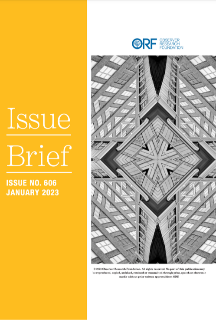"The ongoing crisis in Egypt is symptomatic of the turmoil faced by most of the countries that have undergone a series of mass protests that were broadly labeled as the 'Arab Spring'. These protests had some common elements: they were unplanned, spontaneous outbursts that caught the regimes by surprise with their popular appeal, ferocity, breadth and continued sustenance. Secondly, they were intensely nationalistic uprisings without significant direct material support from outside powers, though the latter were quick to adjust their policies and adapt to new realities. Thirdly, the all-powerful armies in Tunisia, Egypt, Yemen and Libya either stayed neutral and refused to fire on their fellow citizens or came out in support of the people. Fourthly, the people's anger stemmed not only from issues relating to poverty and unemployment but more fundamentally related to issues such as freedom, social justice and dignity of the people. Finally, these protests 'empowered' the people as never before, so much so that they kept coming back to the streets to demand 'course corrections' as the revolution progressed.
They were all united in demanding an end to dictatorship. They were absolutely clear on that but were utterly unclear as to what should replace it. Such is the nature of most revolutions as are not led by a 'vanguard'. During such a power vacuum, the most organised political force in society hijacks the revolution.
Egypt since its independence has had two such organised political forces - the Army and the Muslim Brotherhood (MB). Now since, January 2011 when the 'revolution' began in Egypt, both have been engaged in an intense power struggle, though neither of them truly or fully represented the wishes and aspirations of the 'revolutionary leadership'. Both have tried to fill a void and have come out appearing as square pegs in a round hole.
The reason for this is clear. MB was not in the original leadership of the revolution, in fact in the initial weeks it called on President Mubarak to suppress the unruly mobs. The Army and its discredited leadership was the very target of the revolution. Neither has the moral right to appropriate its leadership now. But what has happened in the streets of Cairo and other major cities of Egypt over the last several months is a churning process that is looking for the true heirs of the revolution.
People wanted to end dictatorships, so the obvious choice was to go for democracy, and democracy meant elections. So they had elections but the results were not to their liking. MB won the elections not because the majority of Egyptians wanted it, but all other political forces were divided and they lost.
The Army, which was unwilling to hand over power to a MB candidate, sat on the election results for a week and after striking a deal declared Mohd. Morsi as the winner. Morsi had agreed not to cross certain redlines and challenging the authority of either the Army or the judiciary.
And of course, there was the hidden hand of America too in his elevation. They made sure that he would not threaten the security of Israel and he made an emphatic assertion of that, in his inaugural address and fully vindicated that pledge in November 2012, when the 11-day war broke out between Israel and Gaza. For good measure, he even promised the Gulf monarchies that MB would not export this revolution, as if it had anything to do with the igniting of it in Egypt in the first place. Now, how come such a pliant ruler who took such good care of the interests of the Army and its masters in Washington was suddenly deposed in such a brazen manner. Well, Washington was certainly confused and did not know how to react to it in the initial days.
Was the Army, as its present Chief El-Sisi repeatedly claims, merely fulfilling the wishes of another wave of 'revolutionaries' - those millions who had signed a petition demanding the resignation of President Morsi. Neither the 1972 Constitution nor the latest one, so hurriedly drafted and got ratified by the Islamists in December 2012, provides for 'recall' of the President by the people, mid-term. So then, where did the Army get its power to dismiss an elected President?
Obviously, holding parliamentary and presidential elections, though a sine qua non of a democracy, is not a complete and sufficient ground for a functioning democracy. Democracy means playing by certain rules. The first and foremost rule is that you don't change rules mid-way. Everyone gets to bat out their full innings without let or hindrance. Secondly, the rulers elected by the people shall be removed by the people, at pre-scheduled intervals with regularity. Thirdly, those who lose the elections sit out and wait their turn. Fourthly, people having voted a government in, go back to their normal business and let the government function without disruption. Finally, the Army is always and forever subordinate to the civilian leadership. It has no right to appropriate for itself the leadership of the people.
But these basic conditions of democracy grow in a political culture of liberalism and are nurtured over years of tolerance of differences and respect for dissent. None of these pre-requisites have existed in sufficient measure in Egypt. Mubarak crushed the Opposition and held fake elections.
Muslim Brotherhood thought that after years of being a victim, it had now gained power and could do what its predecessor did. The Army that had never fully returned to the barracks thought that it should return to its Messianic role and 'save Egyptian democracy'. Pray, from whom? From the 'Islamists'? Then how come the Salfists of al-Nour are fully behind the Army?
Meanwhile, what are Catherine Ashton and William Burns up to, in Cairo? How can they convince a legally elected President overthrown by a discredited Army to share power and work together? The new 'liberal government' headed by Vice President El-Baradei is now talking of providing a 'safe exit' to Morsi. But when did he ever talk of going anywhere? And where is he going? Turkey, Qatar or is it back to his University job in the US?
(The writer is a Distinguished Visiting Fellow at Observer Research Foundation, Delhi)
"
The views expressed above belong to the author(s). ORF research and analyses now available on Telegram! Click here to access our curated content — blogs, longforms and interviews.




 PREV
PREV


